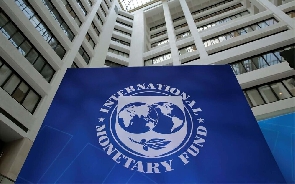 The International Monetary Fund
The International Monetary Fund
The execution of government’s medium-term economic plans, backed by the International Monetary Fund (IMF), will bring the Ghanaian economy back to pre-COVID levels according to a market observer.
However, the recovery process will be expensive for all stakeholders, Apakan Securities remarked in a post-2023 budget analysis.
Per the 2023 budget, government has created the post-Covid-19 Programme for Economic Growth (PC-PEG) as a road map to deal with present economic issues. The main goals of the PC-PEG include re-anchoring inflation expectations, achieving low and stable inflation, and bolstering the exchange rate regime. It also aims to restore fiscal and debt sustainability, and reduce fiscal risks such as those associated with contingent obligations from state-owned enterprises (SOEs).
Deepening structural reforms, regaining market access, regaining investor confidence, unlocking new sources of funding while creating the necessary buffers to strengthen resilience to economic shocks, as well as raising the nation’s sovereign credit ratings and regaining access to international capital markets are additional targets.
“We believe government’s fiscal operations for 2023 will start on a smoother note compared to 2022, which witnessed a delay in the passage and implementation of some key revenue measures (notably the e-Levy). Layering this, passage of the Tax Exemptions bill 2022 by parliament will be a major lever for revenue collections moving forward, as this could help plug a significant amount of cedi lost via tax exemptions over the past years,” Apakan said.
The market watcher noted that with VAT’s significant contribution of circa 60 percent and 24 percent to taxes on domestic goods and services and tax revenue from 2014 to 2021, approval of the 2.5 percent increment will be a boost to total revenue receipts.
“That notwithstanding, a historical trend of revenue collection slippages – averaging about GH¢1.7billion from 2014 to 2021 – as well as expected receding economic growth will remain key risks to revenue targets,” it cautioned.
Government implemented expenditure restraint measures – especially a 30 percent reduction in discretionary spending to make up the income losses – in response to vulnerabilities and slippages in total revenue receipts and a probable full-year shortfall in total revenue for 2022. The containment measures have, however, been countered by soaring interest payments made worse by significant cedi exchange losses against the US dollar. As a result, the first nine months of 2022 saw a fiscal deficit of 7.4 percent of GDP as opposed to the revised target of 6.6 percent of GDP.
Similarly to this, government has set out a wide range of budgetary reductions and containments for 2023 in order to pursue debt and fiscal consolidation in the long term, get an agreement with the IMF and regain public trust in the Ghanaian economy.
“While we see promising expenditures containment measures outlined by government, we still expect a rigorous attempt and commitment by government in its expenditure rationalisation to stay on the path of debt and fiscal sustainability in the medium-term.
“We note that government’s engagement with the IMF has been impressive since the process started in Jul-2022, judged by statements from both parties showing stern commitments to fast-track the completion of a programme as fast as is feasible,” Apakan said.
Nonetheless, it further warned that the crystallisation of a possible debt treatment by government to pave the way for an IMF deal remains a significant risk.